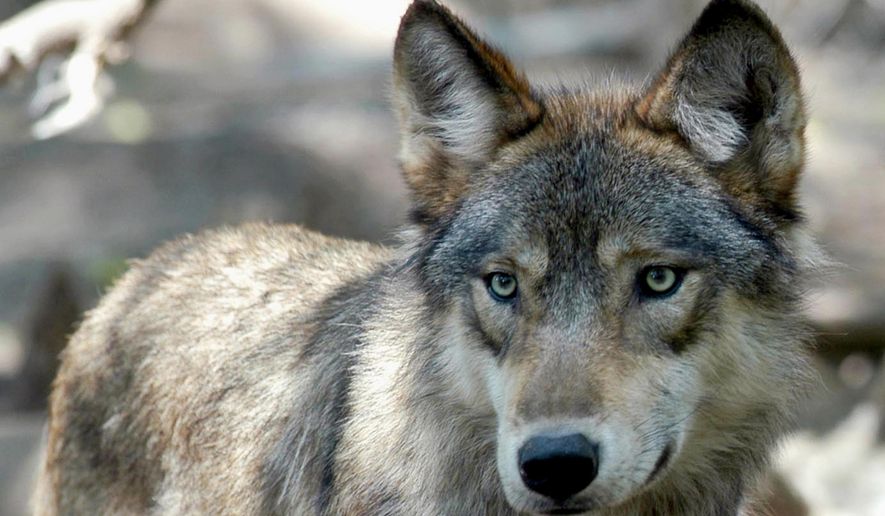Western Republicans accused the Biden administration Thursday of caving to environmentalists over its decision to revisit the 2020 delisting of the gray wolf, hailed as one of the greatest endangered species accomplishments in U.S. history.
The Fish and Wildlife Service announced Wednesday that it will undertake a 12-month wolf status review in the West after receiving two petitions from environmental groups raising alarm about recently signed state legislation to expand hunting in Idaho and Montana.
Rep. Matt Rosendale, Montana Republican, defended the management of his state’s estimated 1,200 wolves, arguing that returning them to the endangered-species list would be “disastrous for the state of Montana.”
“There is no reason why Washington should involve itself at the behest of radical environmental groups,” Mr. Rosendale said in a statement. “This is the Biden Administration’s first step toward classifying the gray wolf as threatened or endangered under the Endangered Species Act.”
WildEarth Guardians agreed, saying the agency’s review means “wolves are one step closer to Endangered Species protection.”
“We are encouraged that the relentless pressure of the conservation community and the public has resulted in a response from USFWS on petitions to relist wolves in the Northern Rocky Mountains and beyond,” said WildEarth Guardians executive director John Horning.
He urged the administration “to not just issue this statement of intention, but to take swift action in moving forward with the relisting process in order to prevent wolves from being pushed back to the brink of extinction.”
The move comes less than a year after the Fish and Wildlife Service declared the gray wolf recovered after a 45-year effort that saw the predators’ numbers climb to 6,000, “greatly exceeding the combined recovery goals for the Northern Rocky Mountains and Western Great Lakes populations,” said the Oct. 29 Interior Department press release.
Environmental groups represented by EarthJustice sued in January to overturn the delisting decision, arguing that the wolves had not been fully restored to their former range, which the agency has said is not the standard for protection under the Endangered Species Act.
Collin O’Mara, president and CEO of the National Wildlife Federation, agreed that the gray wolf recovery was “a great wildlife success story,” but that “too often wolves are not managed according to the best available science” by states.
“We appreciate the U.S. Fish and Wildlife Service’s willingness to take a hard look at the science to determine whether recent legislative actions to reduce wolf populations in certain Western states will have a detrimental effect on wolf recovery,” Mr. O’Mara said.
In March, Montana Gov. Greg Gianforte signed legislation to extend wolf-hunting season and allow snaring and trapping, as well as permit using private funds to reimburse wolf hunters, which critics decried as reminiscent of bounties.
“Rather than once again resort to harmful exploitation and needless persecution, the Service must commit to gray wolf conservation and recognize the incalculable value of having wolves on the landscape,” said the May 26 petition by the Center for Biological Diversity and Humane Society.
Hunting and livestock groups said the measures were needed to reduce wolf kills of cattle, sheep and elk, while state wildlife managers said the population was resilient enough absorb the increased harvest.
“Montana has been effectively managing our wolf population for years, and we don’t need Washington coming in and second guessing our science-based approach,” Mr. Gianforte, a Republican, tweeted Wednesday.
Montana has been effectively managing our wolf population for years, and we don’t need Washington coming in and second guessing our science-based approach. https://t.co/bGXLLR7vuf
— Governor Greg Gianforte (@GovGianforte) September 15, 2021
In Idaho, Republican Gov. Brad Little signed legislation in May that would allow hunting to reduce the wolf population from 1,500 to 150, a 90% decrease, amid alarm over pack activity moving closer to inhabited areas.
“When [wolves] are so fearless that they are now walking down the center of a dirt road, that means there’s too many of them, there’s way too many of them,” Republican state Rep. Dorothy Moon told NPR in May.
Western Watersheds Project (WWP), which headed one of the petitions backed by 70 environmental groups, said that “anti-wolf laws and regulations in Montana, Idaho and Wyoming place wolves at risk of extinction in these states.”
“We urge the U.S. Fish and Wildlife Service to conduct its review as quickly as possible, so that wolves rapidly receive the protections they desperately need,” WWP Executive Director Erik Molvar said.
Republicans on the House Natural Resources Committee argued that wildlife management issues are complicated and “should not be second guessed by Washington, D.C., as Rep. Russ Fulcher, Idaho Republican, put it.
Rep. Bruce Westerman, Arkansas Republican, said it was “disappointing that the Biden administration is caving to these groups and giving credence to these petitions instead of proactively working with states.”
“Once again, radical special interest groups have hijacked the ESA and are wasting taxpayer resources,” said Mr. Westerman, the committee’s ranking member.
Sen. Steve Daines, Montana Republican, said the gray wolf is thriving “thanks to the strong state-led management of the species, and Montana has safeguards in place to ensure that continues to be the case.”
“Activist environmental groups are diverting limited resources from protecting species that are actually endangered in an exercise that we know will be futile,” Mr. Daines said. “If the Biden administration follows the science and data, I am confident this review will prove once again that the gray wolf is recovered and Montana is succeeding in its management of the species.”
• Valerie Richardson can be reached at vrichardson@washingtontimes.com.




Please read our comment policy before commenting.